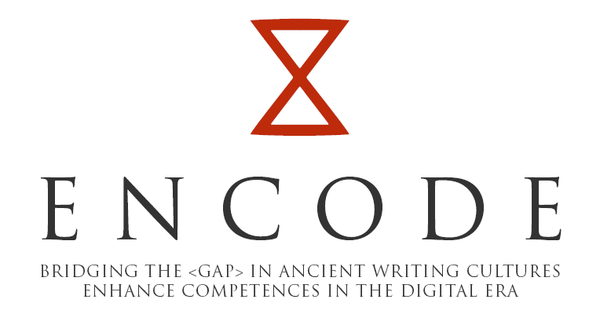Aim of the ENCODE project

ENCODE (Bridging the <gap> in ancient writing cultures: ENhance COmpetences in the Digital Era) is a three-year (2020-2023) Erasmus+ Strategic Partnership funded by the EU, which gathers six academic institutions (Alma Mater Studiorum Università di Bologna, Julius Maximilian Universität Würzburg, KU Leuven, Università degli studi di Parma, Universität Hamburg, Universitetet i Oslo). The project aims at bridging the existing gap in academic education between the highly specialized humanistic competences provided in traditional curricula in the field of Ancient History, Archaeology, Classics and Cultural Heritage and the digital competences required nowadays in research and the job market.
-
to promote collaborative, participatory and intercultural digital approaches to ancient written heritage through new professional profiles and focused training of skilled graduates;
-
to strengthen the crucial cooperation between higher education and cultural heritage institutions by supplying materials for teaching and self-training to academics and providing stakeholders with support services;
-
to meet the learning needs of graduates in the field of highly specialized digital skills applied to the study of ancient writing media in old European, Asian and African languages through innovative teaching modules.
Specifically, the project aims at creating several products including:
-
a shared definition of needed digital competences of graduate students in programmes focusing on written cultural heritage. The framework of digital competences for scholars dealing with ancient written cultures is an adaptation of the international CALOHEE (for humanistic competences) and DigComp 2.2 (for digital competence) frameworks to this particular field;
-
the design and test of innovative and customizable teaching modules, basic and advanced, based on an internationally shared definition of learning outcomes, improving participatory and intercultural approaches to heritage as well as educational initiatives aimed at fostering intercultural dialogue. The modules will use innovative pedagogies, enabling mutual learning among trainees and teachers, lifelong learning for both, and research-based learning and can be integrated into courses in various forms, according to training needs and contexts;
-
a full guide to the teaching modules, including a MOOC, that will enhance the importance of innovative digital training and digital applications, including AI, in the academic and professional environment;
-
a platform for alumni community and stakeholders/employers, which will assure constant and dynamic contact among different actors: employers, institutions concerned with digital curation, professionals active in museums and libraries, alumni, prospective students who want to start their studies in the area of ancient history, languages and cultures and academics who design curricula and training modules.
These tools make use of the material produced by the several events organised by the project, conferences and practical workshops in which experts are invited to discuss recent developments in technologies used in the study of ancient written cultures and to illustrate their functions and ongoing projects. Nine events have been organised so far, most of them linked to training activities:
-
ENCODE Project Conference and Digital Greek and Latin Epigraphy Workshop, Bologna (25-29 January 2021)
-
ENCODE Project Conference Bridging the Gap with Linked Open Data and Linked Open Data for Written Artefacts Workshop, Hamburg 25-28 May 2021
-
ENCODE Conference Multilingual and Multicultural Digital Infrastructures for Ancient Written Artefacts and ENCODE Training workshop Multilingual and Multicultural Digital Infrastructures for Ancient Written Artefacts, Leuven (2-5 November 2021)
-
ENCODE Conference Artificial Intelligence and Inscriptions. Opportunities and practicalities of Machine Learning for Epigraphy, Bologna (11 February 2022)
-
ENCODE Project Conference Papyri and Crowdsourcing and Papyrology for non-specialists. ENCODE Winter School, Würzburg 14-(17 February 2022)
-
ENCODE Conference Digital Critical Editions and Greek Literary Manuscripts and ENCODE Digital Papyrology Workshop, Parma (23-27 May 2022)
-
ENCODE Conference Encoding across Languages and Technologies and ENCODE Intensive Training Workshop Building a MySQL Relational Database for Your Data, Oslo (10-14 October 2022)
-
ENCODE Conference Artificial Intelligence and Ancient Writing Cultures and ENCODE Workshop AI and ancient writing cultures, 23-27 January 2023
-
ENCODE/Epigraphy.info VII Training, Leuven (24 April 2023)

